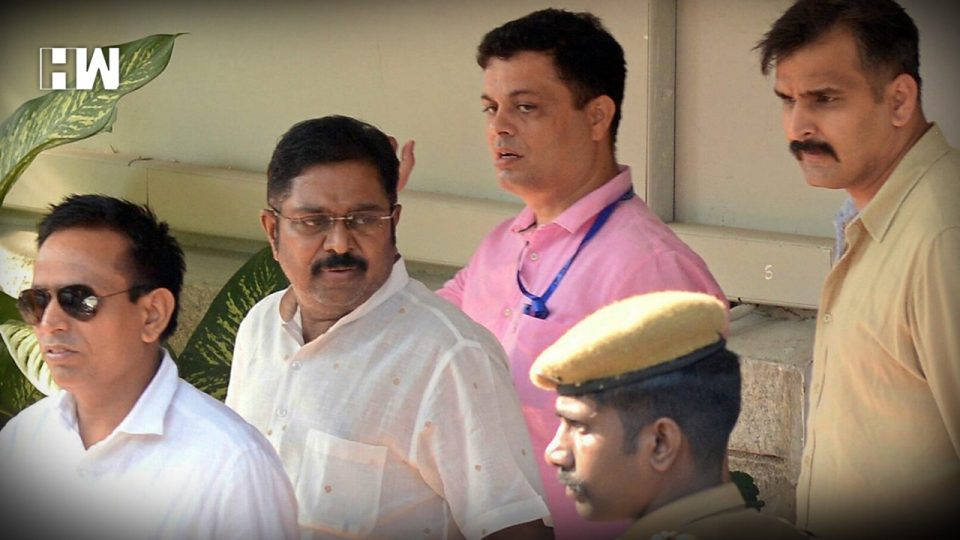New Delhi | The Supreme Court on Monday said it will hear on March 15 the appeal of former AIADMK leader TTV Dhinakaran challenging a Delhi High Court order granting the ‘two leaves’ symbol to a faction led by Tamil Nadu Chief Minister E K Palaniswami.
A bench of Chief Justice Ranjan Gogoi and justices Deepak Gupta and Sanjiv Khana said the matter will be listed on March 15 before an appropriate bench as per the roster.
On February 28, the high court had dismissed the pleas of Dhinakaran and VK Sasikala challenging the Election Commission’s order granting the ‘AIADMK’ name and the ‘two leaves’ symbol to the faction led by the Tamil Nadu chief minister, saying the figures showed the Palaniswami-led group “enjoyed a clear majority”.
It had upheld the EC’s decision of November 23, 2017, saying none of the grounds of challenge raised by the Dhinakaran-Sasikala faction were made out and there was “no infirmity” in the poll panel’s order allotting the party name and symbol to the group led by Palaniswami and his deputy O Panneerselvam.
After the high court order was pronounced, Dhinakaran and Sasikala had urged the court to direct the EC not to allot the ‘pressure cooker’ symbol to anyone during the next 15 days so that they have time to move the apex court and seek an appropriate relief from there. The EC, thereafter, had agreed not to allot the ‘pressure cooker’ symbol to anyone for next 15 days in Tamil Nadu and Puducherry.
Dhinakaran had floated Amma Makkal Munnetra Kazhagam (AMMK) after he and Sasikala were expelled from the Palaniswami-led AIADMK. The symbol issue has been lingering since April 2017 and the verdict came as a shot in the arm for the Palanisami-led AIADMK ahead of the Lok Sabha polls.
The Dhinakaran-Sasikala faction had contended before the court that EC, while trying to ascertain who enjoyed the majority support, ought to have considered the views of the primary members in the party as well and not just its organisational and legislative wings.
Rejecting the argument, the high court had said the petitioners (Dhinakaran and Sasikala) had before the EC claimed that the organisational and legislative wings best represented the wishes of the primary members and “subsequently, changed their stand when the members of such wings changed their allegiance”.
The court while referring to the numbers of General Council members, Members of Parliament and MLAs in support of both factions had said, “The aforegoing figures show a clear majority enjoyed by the faction led by the respondents (Palaniswami-Panneerselvam).”
The EC in March 2017 had given the ‘hat’ symbol to the Sasikala-Dhinakaran group after it froze the use of the ‘two leaves’ symbol to which the group led by Palaniswami and Panneerselvam had also staked claim. The Palaniswami-Panneerselvam faction had at the same time been granted the ‘electric pole’ symbol.
However, on November 23, 2017, the poll panel had ruled in favour of the Palaniswami-Panneerselvam faction by allotting the ‘two leaves’ symbol to them.
The symbol issue has been lingering since April 2017 in the aftermath of the announcement of the bypoll to Radha Krishnan Nagar constituency in Tamil Nadu following the death of AIADMK supremo J Jayalalithaa in December 2016.
Earlier, rival factions led by Sasikala and Panneerselvam had staked claim over the symbol. Palaniswami was then in the Sasikala camp. Later, a large number of legislators led by Palaniswami revolted against Sasikala.
As an independent media platform, we do not take advertisements from governments and corporate houses. It is you, our readers, who have supported us on our journey to do honest and unbiased journalism. Please contribute, so that we can continue to do the same in future.

